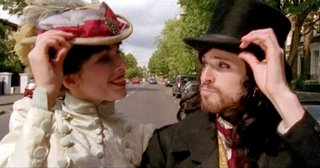
Mea culpa.
Mere days after gently mocking the notion that Brazilian singer Cibelle could be lumped in with the "freak folk" movement, I actually listened to her new album, The Shine of Dried Electric Leaves, and I'll be damned if it doesn't kinda fit in after all. It's also pretty gosh-darned great, all around. I was skeptical because her self-titled debut album struck me as perfectly enjoyable but fairly innocuous School-of-Bebel dance-pop. The new one represents a giant step forward--much weirder, more idiosyncratic, and a lot catchier, if you ask me. (Sort of like the evolution from Bjork's days with the Sugarcubes and her first big solo album to the ones that followed.) The production, by Apollo Nove, is full of cool/quirky little touches that tickle your ears and play with your head, although beneath its occasional psychedelic flourishes, it's still a generally mellow affair. Special guests include Seu Jorge and Spleen, and there's a nice Tom Waits cover--in fact, roughly half the songs are in English, if you care about such things.
Given my generally lukewarm response to that earlier disc, I probably wouldn't have gotten around to this one so quickly if it weren't for this brief "Global Hit" spot on The World, focusing on Cibelle's cover of Caetano's "London London." First you hear his original, written during his enforced exile in that city in the early 70s, then her remake, a duet with freakfolk godfather Devendra Banhart celebrating her own time in the same town four decades later. The highly informative interview between the two versions is well worth a listen, despite a slightly confusing moment where it sounds like Cibelle is being put forth as a spokesperson for tropicalia, a movement that surely peaked before her birth. (When she says ""We're all just absorbing each other and playing together and experimenting, and it's all so nice," I have a feeling she's referring to the international scene in 2006, not Brazil in 1966, as the host implies.)
The album is available here to eMusic subscribers, and you can also find it via iTunes. The label, Crammed Discs/Ziriguiboom, is the place to check for several RealAudio samples and a charming video of "London London" as well as one for her cover of Nirvana's "About a Girl," available on an EP. (Watching the "London" video, I would in no way be surprised if Mr. Banhart starts popping up in indie features soon; he's a natural.)